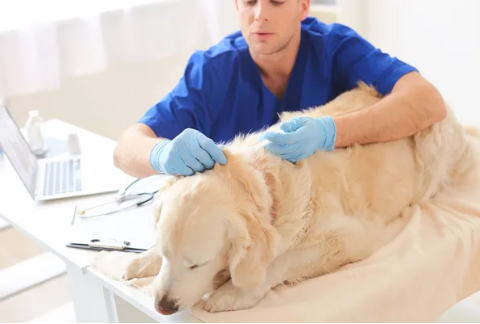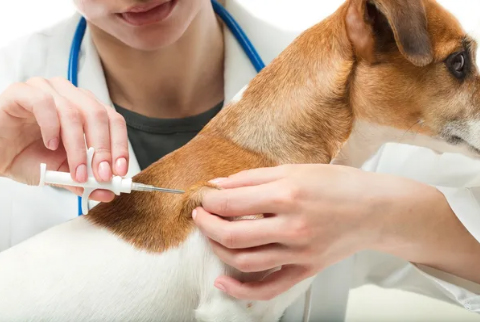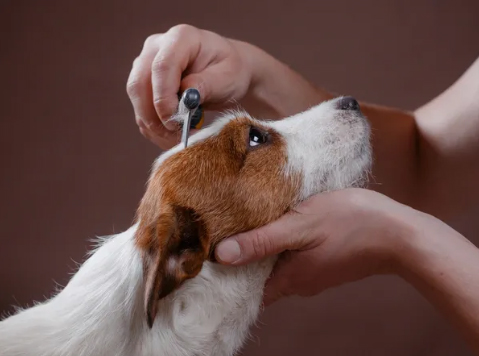Caring For Your Dog Or Puppy

Dogs are one of our most popular pets in Australia and it’s not hard to understand why.
We love dogs because of their unconditional love and loyalty but it also brings a huge amount of commitment and responsibility.
Dogs need daily exercise, somewhere sheltered to sleep, a balanced diet, regular veterinary care and training. We have put together some basic advice about caring for your dog or puppy, we hope you find it useful.
Dental Care For Cats

Dogs and cats can develop dental problems at any age and many over six years of age have some degree of dental disease.
Dental disease categories
Gingivitis - this is inflammation of the gums. You can easily see this by the increase in the pinkness of your dog’s gums, especially at the gum line.
Tartar - is the accumulation of plaque on the teeth, usually starting at the gum line in conjunction with gingivitis.
Pyorrhoea - is the most serious – it is pus in the mouth, usually between the teeth and the gums. Not only does it cause decay and bad breath but the bacteria may enter the blood and travel to other parts of the body causing more serious problems. The liver, kidney and heart are commonly affected.
Does my pet need a scale and polish under anaesthetic?
Flea Control For Dogs

Do you know that just 5% of fleas live as adults on pets?
The other 95% of flea population lives in the home. Within a few days of their first blood meal, adult fleas lay non-sticky eggs. These will drop off onto surrounding carpets and bedding waiting to hatch. These eggs will hatch to produce larvae that feed on flea faeces and organic matter found in the environment. Larvae dislike light and tend to live deep in the carpets and in soil. Adult Fleas lay up to 50 eggs per day, about 2,000 in her lifetime. When they detect a host nearby, adults will come out of their cocoons. Once they hop onto a host, the adults mate and the life-cycle starts all over again. The newly emerged flea may bite humans before jumping off to find a more suitable host. A flea's entire life cycle can be as short as three to four weeks.
How do flea diseases transmit
Not only are fleas annoying. Some people and animals suffer allergic reactions to flea saliva resulting in rashes and/or impotence. Fleas can also act as a vector for disease (viral, bacterial and parasites) to humans and animals. An animal can die from a serious infestation of fleas if it is not treated.
When can I start a flea treatment?
Fleas are an all year problem. They love our our warm weather as much as we do. Preventing an infestation is much easier and much more effective than trying to treat one that already exists. Ridding your home of an existing infestation can be a long (months, regardless of the flea product you use), labour and expensive process. Just because your animal doesn’t go outdoors doesn't mean he is safe from fleas. Indoor cats can and do get fleas just as easily. Fleas can also hitchhike on your clothing and come inside with you. They can come in with other pets that do go outdoors. They can also find their way inside through very small openings. We stock a wide range of flea control medication and creams.
Kennel Cough

Kennel Cough is more formally known by vets as Infectious Tracheo-Bronchitis. It is actually several different viruses and bacteria that gang up together to cause respiratory disease (nose, throat and chest). The main cause is a bacteria called Bordetella. This is very infectious and can spread rapidly from dog to dog. It can be picked up anywhere not just in kennels ie in a park, in the street, at a dog show, anytime, anywhere, wherever a dog meets another dog. In situations like kennels (where the disease gets its name from) or dog shows it can spread like wildfire – which is why most kennels recommend vaccination against Bordetella before they will allow your dog to board.
What are the symptoms of Kennel Cough?
The main symptom of Kennel Cough is a hacking cough – it often sounds like something is caught down the dog’s throat. Other symptoms can include sneezing, a runny nose, fever, feeling poorly and off food. The disease is rarely fatal but can be hard to get rid of and a long course of anti-biotics and/or anti-inflammatories can be needed. It can take a couple of weeks for Kennel Cough to incubate in your dog, so sometimes symptoms do not show until a week or two after kennelling.
Vaccination
To vaccinate a small amount of vaccine is dribbled up the dog’s nose. The vaccine now lasts a year (it used to be only six months), and needs to be given at least two weeks before going into kennels. It is important to remember that the vaccine only protects against the Bordetella form of Kennel Cough. Occasionally another virus or bacteria can cause Kennel Cough symptoms, even though your dog is vaccinated.
Neutering Your Dog

Males
There are several advantages to having your male dog castrated. Our vets can discuss with you the best age this can be done from. The benefits can be behavioural as well as physiological. Some castrated males can become more content and less interested in female dogs. They are less likely to get lost or injured while in the chase. They can be easier to train as they concentrate more on what the owner is saying rather than worrying about their hormones! Physiologically, castrated males will obviously not develop testicular cancer as both testicles are removed in the castration. Prostate problems are very common in entire males as the hormones produced by the testicles stimulate the prostate. Prostatic enlargement can cause constipation or problems passing water. Enlarged prostates are more prone to infection and prostatitis is a very painful condition and can make the dog seriously ill. Sometimes abscesses can develop in the prostate following infection and again these can cause severe problems.
Females (bitches)
The biggest advantage of spaying a bitch is no unwanted pregnancies and you do not need to keep your bitch shut away when she comes into season. Some bitches, following a season, develop a pseudo-pregnancy where they think they are pregnant. Spaying prevents this happening. Spaying a bitch before their first season reduces the risk of developing mammary cancer. The risks following each subsequent season increase as the majority of cancers are under hormonal control. A large percentage of mammary cancers are malignant so can be fatal if action is not taken immediately. Entire females can also develop a condition called Pyometra when the womb fills with infection. This normally occurs after a season. The bitch will be lethargic, is often sick and will drink more than usual. As antibiotics will not treat this infection an emergency spay has to be performed. This is a higher risk than a normal spay as the bitch is already poorly. With both male and females, you need to watch your pet’s weight post-neutering and our vets will be able to advise you on a suitable diet and exercise.
Nutrition

I have a new puppy, what food should I feed him/her?
Finding the right diet for your dog or puppy can be very difficult in a market that is flooded with such a wide variety of pet diets. Always bear in mind that the needs of your dog will change throughout its life and different species and breeds may require different diets.
When you collect your new puppy, it's a good idea to check the diet the animal has received. Sometimes these diets can be very strange concoctions and not at all balanced in minerals and vitamins. We recommend feeding your puppy food that has been properly formulated and has a feeding guide to enable you to supply the correct amount of calories.
Puppies grow rapidly, so it is important that they are fed a diet that is correctly formulated for their needs. Manufactured puppy foods are formulated to provide nutrition without the bulk. Puppy formulas have good levels of high quality protein to support healthy tissue and organ development, higher levels of essential minerals such as calcium, phosphorus, magnesium, zinc and iron, as well as vitamin D to help build strong bones and teeth.
Puppies have small stomachs but large appetites. Puppies up to four months of age puppy should be fed four meals a day, reducing to three meals a day until six months of age and thereafter two meals a day. Overfeeding your puppy will cause digestive upset and could lead to painful bone problems in the future – plus, overweight puppies turn into overweight dogs.
It is important not to feed your puppy immediately before or after exercise. Resting after feeding and also soaking dried food before feeding, helps to prevent the risk of swelling or twisting of the stomach. Puppies are also best fed in a quiet place away from interruptions.
I have an adult dog, what is the best diet for him/her?
Once your dog reaches maturity it is time to settle into a regular feeding routine and change to a maintenance diet. Dogs are regarded as mature from nine months in small dogs but twelve -eighteen months in larger breed dogs.
Any diet change should be done gradually over one week to avoid stomach upsets. Your dog’s diet needs to contain the correct balance of nutrients and any good quality manufactured complete food will provide your dog with all the basic nutrients. Canned or dried or a mixture of the two may be fed.
There is also a wide range of commercial diets available to match the needs of specific breeds of dogs. Food should be fed at room temperature and do not feed your dog immediately before or after exercise.
I have a senior dog what do I feed him/her?
Senior diets can be introduced from five years of age in larger breed dogs and seven years in smaller breed dogs. As senior dogs are less active and have a slower metabolism, fewer calories and fat are required. It is therefore advisable to move older dogs onto this food. We stock a wide variety of specially formulated food for senior dogs or ask us for a special order.
Manufactured senior dog foods are carefully formulated to reflect the changes that occur as a dog gets older. The frequency of meals for the older dog can still be one to two meals daily but sometimes they may prefer smaller portions more frequently. It is important not to over feed older dogs as they may put on weight which will lead to increased stress on their joints and worsen any existing arthritis.
Vaccinating Your Dog

Here at Comet Bay Vet, we believe that ‘prevention is better than cure’. We frequently see unvaccinated puppies with parvovirus, which can be very fatal. Kennel Cough is another extremely common illness that we see in dogs of all ages. Both of these and many other diseases can be prevented or kept to a minimum just by a simple vaccination. Yearly booster vaccinations are recommended to ensure that your dog’s immune system is always prepared in its constant fight against disease. Although treatable we recommend vaccinating against the following diseases to help protect your dog.
What should i vaccinate my dog against?
Normally, it is advisable for puppies to be given an initial course of three vaccination injections, from six to eight weeks old, followed by a booster vaccination on an annual basis. A multivalent vaccine is used which means that with one injection we are actually vaccinating against a variety of diseases. The vaccination will help protect your dog against:

Kennel Cough (Infectious bronchitis) - Extremely contagious between dogs. and is accompanied by harsh hacking cough.
Adenovirus - Causes hepatitis.
Para-Influenza - A respiratory virus that is another component of Kennel Cough. Vaccination reduces the likelihood of your dog contracting this infection and reduces the severity of the illness if your dog does become infected.
It is never too late to start a vaccination programme even for an older dog and our vets will be able to advise you on this. Elderly dogs have a weaker immune system so it is especially important to keep their boosters up to date. In addition, most kennels will not take dogs for boarding unless they have an up to date vaccination record. Accordingly, it is wise to ensure that your pets have their annual booster. If more than 12 months pass between boosters, your pet may have to start the primary vaccination course again, as its immunity to disease will have deteriorated.
Weight Watching For Dogs

We have heard much about human obesity in the media. Unfortunately, we are seeing the same trends in our pets. Obesity leads to many health problems in our pets. The extra weight puts more pressure on, the heart and joints. It can also lead to hormonal problems such as diabetes. Overweight animals can have trouble grooming and sores can develop where skin folds rub together.
If you suspect your pet is overweight, speak to one of our vets who can advice on a change of diet. When running your hands over your pet’s ribcage, you should be able to feel each individual rib without having to press too hard and you certainly shouldn’t be able to “pinch an inch”.
We stock a variety of prescription diets that are ideal for weight loss. These are specially formulated by being low fat but high fibre so they have less calories but the fibre helps to fill your pet up.
When you bring your pet, he/she will be weighed and an estimate made of what your pet should weigh. An accurate measure can then be made for the amount of food to be fed. The pet can be weighed again in a month and the degree of weight loss assessed and then the amount fed changed accordingly. Once your pet has lost the desired amount of weight, it can be changed on to a diet to maintain that weight.
Close monitoring is advisable to ensure extra kilos don’t sneak back on.
Most pet owners are really pleased when their pet successfully loses weight. Pets tend to be much brighter, have more energy and owners can often save money on things such as painkilling tablets that were needed for arthritis.
Our hospital is open for a free weigh in with a nurse. So feel free to pop in anytime to help you keep an eye on your fur baby's weight.
Worm Control In Dogs

Pets pick different types of worms in a number of ways – from other infected animals, from their mother if she is infected while pregnant, or from eating worm eggs in infected faeces, urine or grass.
Roundworms - These are very common in puppies and stray animals. Roundworms can infect humans and cause varying illnesses from mild abdominal pain to blindness and can even cause death in puppies and kittens. Not worming your dog regularly can cause a build-up of worm eggs in the environment, especially in areas such as parks where many dogs are walked which is quite concerning because this is where many children play. It is therefore a good habit to clear up any “mess” your dog leaves when on a walk!
Tapeworms - These are as common as roundworms. The main way of catching them is from fleas. If your dog’s flea treatment is up-to-date your dog should not have any tapeworm living in their intestines. They can, however, be picked up by animals that hunt or if you feed your dog raw meat.
Heartworms - Adult heartworms are found in the heart and adjacent large blood vessels of infected dogs. One dog may have as many as 300 worms present when diagnosed. The most obvious clinical signs of heartworm disease are a soft, dry cough, shortness of breath, weakness, nervousness, listlessness and loss of stamina.
How frequently should I worm my pet
Worming your pet is important but the frequency of doing so varies depending on age and life style. Puppies should be wormed monthly until 12 weeks old because the majority will have roundworms. Animals that go outside should also be treated regularly. There is a very good spot-on treatment available from our vet hospital that not only eliminates fleas but also provides a monthly roundworm treatment. If your dog has fleas then it will need treatment for tapeworm every month and monthly flea control is advisable. If your dog hunts or eats raw meat, it should be treated for tapeworm every month. Bitches should be wormed during pregnancy to reduce contamination to the puppies. If you have any queries regarding worming your pet then consult our vets and we will advise you of a suitable regime.
